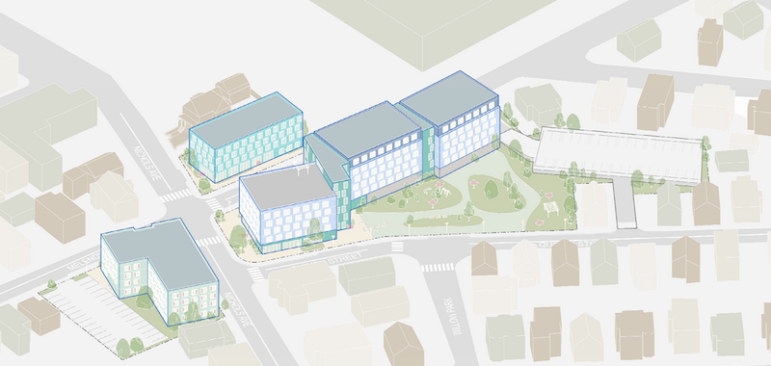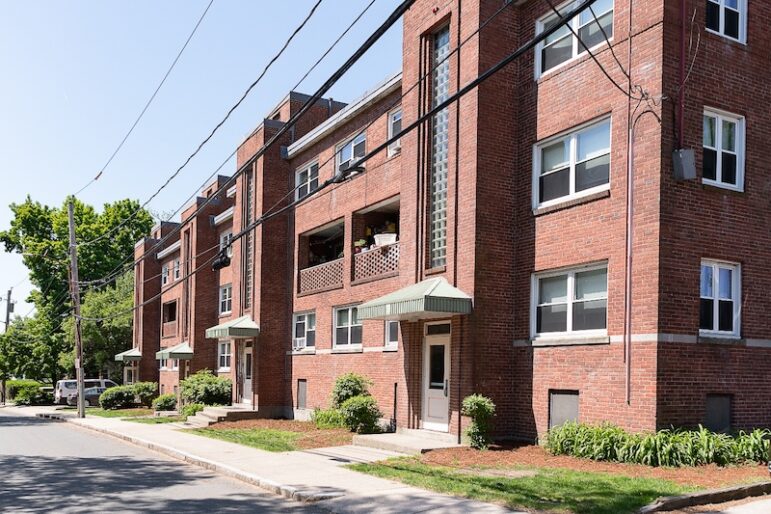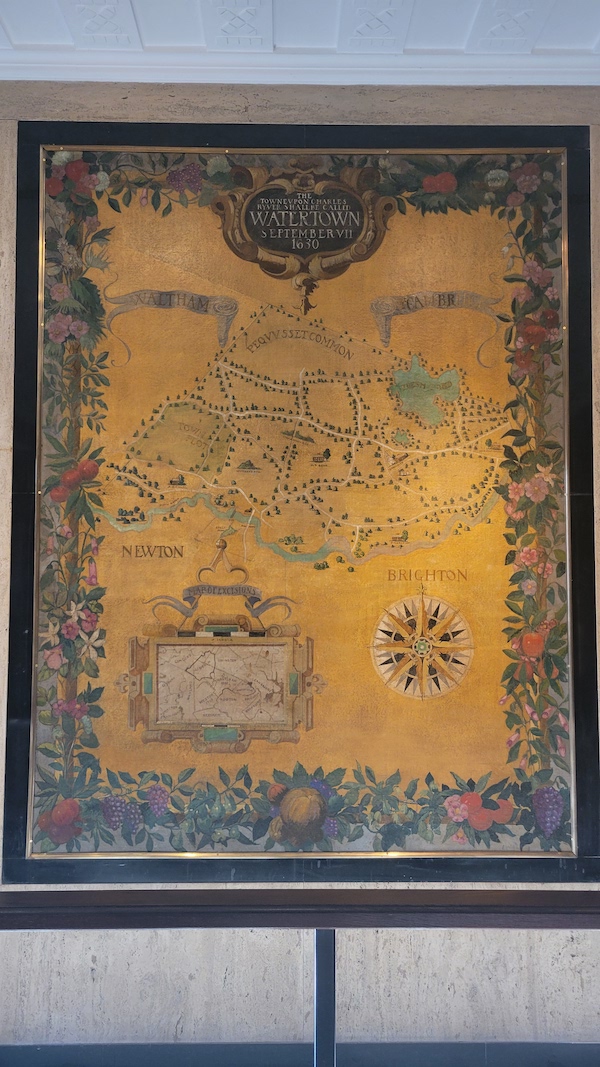
The first new public housing building in Watertown to be constructed in Watertown in decades took a significant step forward when the City Council approved spending Community Preservation Act funds on the project at Willow Park on Tuesday night.
The development will create 138 units on the site of 60 that currently has units. On Tuesday, the Council approved the Community Preservation Committee’s recommendation to spend $4 million in CPA funds on the project. Councilors also approved money to cover the cost of the restoration of historic paintings that hang in the lobby of City Hall.
Mark Kraczkiewicz, the chair of the Community Preservation Committee, said the approval of the funds represents a milestone for CPA in Watertown.
“The grant is, in fact, the largest expenditure of CPA funds in Watertown,” Kraczkiewicz said. “It takes place on a 2.2 acre site, and also includes the acquisition of a 0.1 acre house next door so they can expand the affordable housing community.”
Willow Park will be operated by Preservation of Affordable Housing (POAH), a group that owns and operates over 13,000 units around the country including 5,000 in Massachusetts. Cori Mian, POAH Vice President for Real Estate Development, said the Watertown Housing Authority will maintain the ground lease to the land, and is a 27.5 percent partner in longterm operations and in the entity that will control the project.
The total cost of the project is $107.5 million, Kraczkiewicz said. The current residents of the 60 units at Willow Park will be relocated and given the right to return into the new units, Kraczkiewicz said. Before the vote he said:
“The money you would approve, $4 million — adding to the $400,000 from the Affordable House Trust for pre-development costs — is but a small portion of that total budget, but nonetheless is an essential portion. It shows the City of Watertown has a commitment to creating afford housing, a commitment that is important to the state and federal funders of this project.”

The funds to cover the remaining cost of the project comes from multiple sources, including Low-Income Housing Tax Credits, a mortgage from Mass Housing, a construction loan, funds from state programs such as workforce housing and the Public Housing Innovations Demonstration Program, Kraczkiewicz said.
“Importantly, only the mortgage finance will require debt service payments after project
completion, meaning that project rental income should be sufficient to cover operating and maintenance costs, plus debt service on the mortgage finance,” he said.
As part of the recommendation, the Community Preservation Committee (CPC) included several conditions:
- The CPA funds will be available for 40 months, and could be extended if requested in writing by the CPC.
- The CPC will be a joinder on the lender advisory agreement for cost review and construction monitoring.
- There will be a perpetual affordable housing restriction in place on the development
- The developer strives to achieve 70 percent local preference for units.
City Council President Mark Sideris said he thought that the CPC did a good job working on the details of the project to set it up for success.
“I think we are sending an important message as they continue to try to get funds from the state and the feds that the City of Watertown is committing $4 million to the project,” Sideris said. “I think that is an important piece of this, and I think the CPC did a good job discussing and making sure that the funds are there.”
Councilor Tony Palomba thanked the CPC for all the time it spent asking questions and coming up with a plan for the project.
“This is the first time we have had affordable housing proposed in Watertown in quite a number of years, and it is really a step in the right direction,” he said. “I am really appreciative of POAH and the Housing Authority, and a great thank you to the CPC.”
Most of the Watertown Housing Authority’s complexes date back to the 1950s, with the most recent, the Joyce Munger Apartments on Warren Street, being built in 1983.
Council Vice President Vincent Piccirilli noted that the City Council has put a priority in creating more affordable housing, and said it was important to provide the seed money. He added that having conditions to protect the City of Watertown and the taxpayers’ investment, and that having a self-sustaining development is good model.
“I am very pleased about the repositioning, as envisioned by Watertown Housing Authority and POAH, to provider more housing there, more modern housing with a range of affordable price points to make it work,” Piccirilli said. “I think that the future of building really successful affordable housing projects is to have enough revenue to pay to run the building.”
City Councilor Lisa Feltner said she was glad to see that the project includes 11 units with mobility access, both for people with disabilities and people with sensory needs.
Councilor Nicole Gardner thanked the Watertown Housing Authority and POAH for the work the did both working with the community and with the design of the project.
“I was so impressed by this — the degree of interaction, input and time spent within the neighborhood, both with residents and neighbors,” she said. “As well as with design. It’s not just housing, it attends to the whole person. … safety, learning sessions, and helping people find pathways to education and employment, and so on and so forth. I think it’s what people need and value. I think it helps create strong, stable communities, and strong stable families and individuals.”
The City Council approved the $4 million in CPA fund unanimously.
City Hall Paintings

On Tuesday, the Council also approved $14,503 in CPA funds to cover additional costs in the restoration of the historic paintings in City Hall. Kraczkiewicz said the work was more extensive than originally anticipated, and the art conservator spent 136 hours on the project, which was expected to take 45 hours.
The City Council approved the CPC’s request for $33,000 in 2022 for the project. The paintings returned to City Hall in November 2024 after nearly two years of restoration.
I’m very happy that there will be new units in an affordable housing complex. I would like to know how “affordable” is calculated. If it is calculated based on the average income in the area, that’s not truly affordable. Basing it on median income would make more sense. I look forward to seeing more responses and comments on my ideas.
Also, the number of accessible units seems very low. Many people who stay long term may need accessibility accommodations down the road. I believe that should certainly be taken into consideration when the building begins. Many buildings represent themselves as handicapped accessible simply because they have a ramp. But for people with disabilities it is very hard to open heavy exterior doors, which should open automatically with a special keycard. That would go a long way to making these units truly accessible.
A commenter asked if there be any units set aside for Veterans? And said Waltham recently passed a bit to give a number of units “Veteran preference”.
Very excited to hear this good news!
This is amazing! I am very glad that some of the CPC money is finally going to affordable housing bucket! Outside of the the housing that will house five persons with disabilities (which super important on its own given the dire need), I don’t think I have seen any CPC funds spent on housing. I could be wrong. Regardless, I wish the law was written so that the a municipal CPC could hold the funds until a municipality establishes an Affordable Housing Trust or until an existing Affordable Housing Trust can set up administrative activities to manage the funds. The Affordable Housing Trust really has the expertise and the funds should reside with it. I would also like to thank and congratulate POAH! POAH is an excellent example of what organizations can do within current systems and structures, which are rather complicated. I nominated POAH for the CRCC Watertown award for non-profit because I wanted them recognized for their efforts. Congrats again!